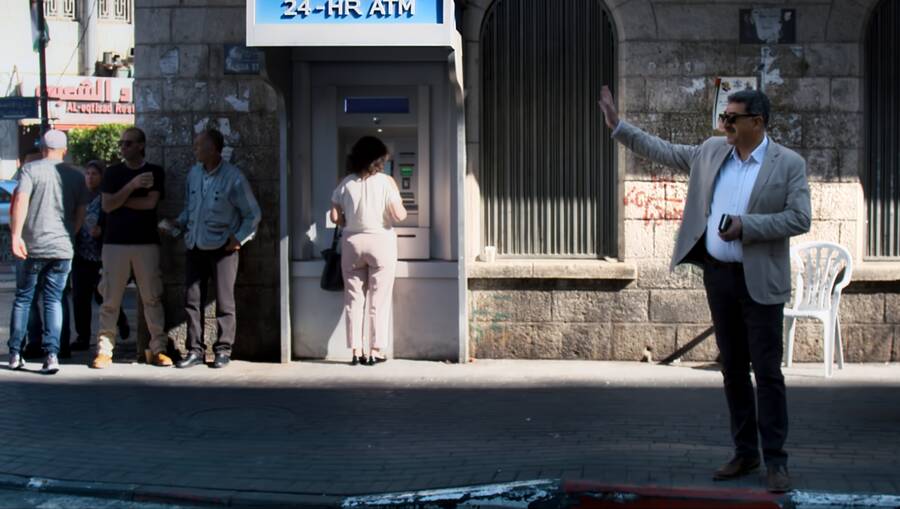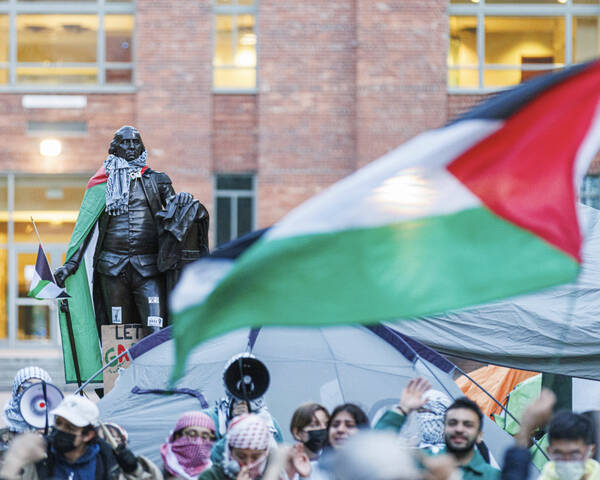A City Without a Country
Mayor, a documentary about Ramallah mayor Musa Hadid, is a devastating satire of local governance under occupation.

IN THE FIRST SCENE of the new documentary Mayor, Ramallah Mayor Musa Hadid walks to a modern city hall for a meeting on city branding. Seated around a conference table with an Excel spreadsheet projected behind him, Hadid and his advisors argue over a clunky bit of marketing lingo they are trying to roll out: “WeRamallah,” with the “R” pronounced as in Toys‘R’Us. Hadid seems underwhelmed, almost embarrassed. “I still don’t understand what city branding is,” he says. “You’re just giving me slogans!” He wants to talk about traffic lights, signage, trees; the city’s “brand,” he maintains, should be its healthy functioning. Hadid’s advisors can’t really explain the point of the exercise; one suggests hiring a consultant to figure it out. The mayor leaves in a hurry, walking outside past an enormous freestanding sculpture that spells out “WeRamallah.”
The meeting sets the tone for Mayor, which—unlike many representations of Palestinian life destined for an international audience—focuses not on experiences of spectacular violence, but on everyday matters of civic life. And yet, of course, these matters are themselves thoroughly colored by the occupation. The film explores this dissonance through the figure of Hadid, who struggles to make life for Ramallah’s citizens a little easier, and to connect Ramallah—the de facto capital of the West Bank, hemmed in by Israeli settlements—to the outside world.
Not so long ago, technocratic mayors seemed like they would lead their cities to a glorious new post-national future. According to this line of thinking—epitomized perhaps by political theorist Benjamin Barber’s 2013 book If Mayors Ran The World: Dysfunctional Nations, Rising Cities—cities were the engines of globalization’s unstoppable dynamism, held back only by sclerotic, outmoded national politics. Mayors, in contrast with presidents or legislators, were able to cut through ideology, history, and politics to focus on “what works.” In this view, cities had the potential to transcend their local contexts and work together across national borders. Mayors of the 21st century wouldn’t do politics in the old mold; instead they would act like celebrity CEOs, with full autonomy to execute their vision. It was a vision of post-political managerialism, with manager par excellence Michael Bloomberg as its paragon and foremost champion.
Part of the genius of Mayor is that it shows how much Hadid wants to embody that ideal—to make Ramallah “work.” An old-school PLO hand who entered politics during the First Intifada, Hadid now finds himself in late middle age with the organization in disarray, far from the vanguard of the fight for Palestinian nationhood. (When a young boy asks Hadid which political party he supports, Fatah or Hamas, he deadpans, “The Popular Front for the Liberation of Palestine”—the largely defunct Marxist-Leninist revolutionary group. “They don’t exist anymore!” the boy replies, doubling over with laughter.) Hadid has responded to this impasse by burrowing deep into civic service. “Local governance is the most beautiful field of work in our country,” he tells a group of grad students from Birzeit University. “People can say at any time, ‘We don’t want our government. We want to go back to the way it was before.’ But I’ve never heard of someone calling for the shutdown of a municipality.” Hadid tours a school to inspect classroom doors that aren’t closing and worries about the relocation of public bathrooms destroyed in the course of new construction. When Israeli troops make an incursion into the city and provoke resistance from masses of Palestinian youth, Hadid doesn’t try to calm tensions, nor does he attempt to lead from the barricades. His job is to get cleaning crews to pick up all the rocks.
Director David Osit, an American who studied refugee law before turning to documentary filmmaking, doesn’t play Hadid’s struggles for pathos or nobility. Rather, the film is—at least frequently—a comedy. Pitched to funders as “Parks and Rec on the West Bank,” Mayor is potent and memorable in large part because it is hilarious. The film’s humor comes from the ironic gap between the enormous stakes of the Palestinian struggle for freedom and the mundanity of daily life in Ramallah. Filming coincided with the Trump administration’s recognition of Jerusalem as Israel’s capital in 2017, which registers in the movie not just as a catastrophe, but also as an annoyance: Hadid wants to watch the news but the cable doesn’t work in his office. And like all good satire, Mayor has a smoldering core of outrage, a place where the laughing stops. Hadid voices that outrage most forcefully to foreigners he knows don’t understand or simply don’t care, as he does with a German government delegation that wants to engineer a photo op with Ramallah residents and Israelis without bringing up “politics.”
A stateless former civil engineer who lives in a modest apartment with his adult children, Hadid lacks the Bloombergian resources or global connections to shape Ramallah to his will. He manages as well as possible: Ramallah’s downtown appears to be an urbanist’s dream of active street life, well-used public spaces, and bustling local businesses, and residents seem genuinely thrilled to meet him on the street. Under Hadid’s supervision, the heavily Christian city pulls off an over-the-top Christmas celebration, complete with a laser light show, booming EDM renditions of holiday classics, and a score of Santas rappelling down nearby buildings. A bit of B-roll showing young Palestinians posing for selfies in front of the WeRamallah sculpture suggests that even if Hadid and his team can’t explain the point of their slogan, it has become a part of the city’s identity.
But these moments can seem more like consolation than triumph. There are hard limits to Hadid’s ability to keep the city running amidst the occupation; shit rolls downhill, shit bubbles up from below, and the mayor can only clean up so much of it. Sometimes the shit is literal: In one sequence, Hadid races around the city as sewage overflows onto streets and into valleys where farmers grow olives. At first it’s played for laughs, a la Parks and Rec. But the reason excrement is all over the place is that Israel refuses to grant Ramallah permission to build a sewage treatment plant. The malfunctioning sewer system is inseparable from the pressure of ongoing historical trauma.
After two decades running the West Bank’s de facto capital, Hadid has seen all the things he cannot do for his city: He cannot provide its citizens with their own currency (they use Israeli shekels) or freedom of movement; he cannot administer justice; he cannot keep his city safe from an occupying force. Whatever Hadid does to foster basic civic functionality, he will always fight with both hands tied behind his back. Ramallah, then, inverts the idea of cities transcending nations: It has not so much escaped national politics as it has been abandoned by them. As Hadid puts it in a speech during a trip abroad, Ramallah is essentially a “city without a country.”
Acutely conscious of these limitations, Hadid delights in what he can control. He seems happiest and most at peace when he can devote himself to his pride and joy, a computer-programmed fountain in the plaza outside Ramallah’s city hall that coordinates water and light shows with songs by the likes of Celine Dion. Like the WeRamallah statue, the fountain is a kitschy consolation, yet it’s also a genuine center for civic life; families throng the plaza, transfixed by a computerized animation projected over city hall and a fountain and light show set to an Andrea Bocelli duet. But even such humble achievements are imperiled by Israel’s occupation, the weight of which grows even more crushing when it receives the Trump administration’s unqualified backing. During the film’s climax, a stunning extended sequence capturing an invasion by Israeli troops and the subsequent clash with protesters, Hadid ensures the safety of tear-gassed journalists who seek shelter in Ramallah’s city hall, giving one a back massage as he gets his eyes washed out by a medic. It’s simultaneously an act of solidarity and a savvy PR move. After the troops and crowds disperse, Hadid’s heart swells as he sees the fountain has survived the clash. That’s about as good an outcome as he can hope for.
This is what it really means to live in a city without a country: If the nation is dysfunctional—or nonexistent—the city can’t just rise above in the manner suggested by Benjamin Barber. “What works” is inseparable from politics, ideology, and history. Perhaps more than most elected officials, mayors are squeezed from above and below, contending with both the fallout of high politics and the tensions of street politics alongside the endless quotidian friction generated by basic day-to-day governance. Indeed, Bloomberg could govern New York City with apparent ease not because he could “rise above” politics, but because he chose sides: He and the plutocrat class that owns so much of New York were one and the same, and he could use his personal fortune to subsidize services, culture, and local stakeholders’ pet projects.
Globally hyperconnected and wealthy beyond measure, contemporary New York has all the resources Ramallah lacks. But as many New Yorkers learned or recalled in 2020, that security and prosperity is fragile. I first watched Mayor in early December, nearly a year into the pandemic and following months of protest against state violence. Amidst the worst mass casualty event in its history, New York stared down brutal budget cuts imposed by a federal and state government seemingly more concerned with screwing local elected officials than giving my neighbors and me the support we needed. New York isn’t under military occupation like Ramallah, but during the uprising last summer, NYPD drove cars into demonstrators, kettled marchers for mass arrest, and indiscriminately beat people engaged in constitutionally protected dissent; Chief Dermot Shea even spread misinformation that the Black Lives Matter movement had stockpiled bricks to assault officers, an accusation that echoed Israeli justifications for violence against rock-throwing Palestinian protestors. Amidst the overlapping crises, Mayor Bill de Blasio seemed not only outmatched by events but uninterested in the thornier aspects of the job he’d been elected to do. This past year, New York was a city without a country, and without a Musa Hadid, either.
Alex Yablon is a writer and reporter in Brooklyn. His work has appeared in The New York Times, The New Republic, Business Insider, Foreign Policy, CityLab, Politico Magazine, Splinter, The Atlantic, Vice, Slate, New York Magazine, and The Trace.

